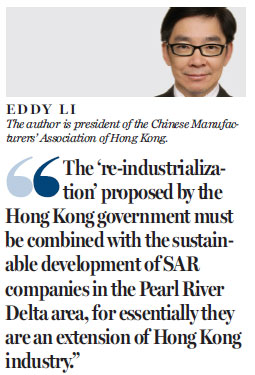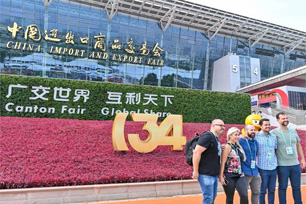Newly established ITB can help HK firms in Guangdong
Since the establishment of the Innovation and Technology Bureau (ITB), which has gone through all kinds of obstacles, the public has paid quite a lot of attention to the new department and government's related policies. In the Chief Executive's latest Policy Address (PA), there are 24 paragraphs devoted to specific measures taken or going to be taken to help develop this industry.
The SAR government plans to expend a total of HK$4.7 billion in different projects to push forward innovation and technology development. These include HK$2 billion to further encourage University Grants Committee-funded institutions to carry out more research projects; HK$2 billion to encourage investment from venture capital funds in innovation and technology startups; HK$500 million to set up an Innovation and Technology Fund for Better Living to finance projects which make use of innovation and technology to improve our lives; and HK$200 million to launch a Cyberport Macro Fund for investment in its information and communications technology startups.
As suggested by the CE, a city's capability in innovation and technology is vital to developing its society and economy. Innovation and technology is the new engine for economic development, as well as a tool to enable the residents to live a more convenient, comfortable and secure life. As a businessman, I naturally attach great importance to this part of the PA. I believe innovation and technology is the dominant sector in regard to international competition.
In Paragraph 77, the Chief Executive mentioned the term "re-industrialization" - a potential new area of economic growth for Hong Kong. The government and the Hong Kong Science and Technology Parks Corporation have revised the industrial estate policy. Apart from constructing multi-storey buildings in the remaining space of the industrial estates for lease to innovation and technology firms, the SAR will also try to bring idle factory premises back into use. This will help promote smart production, attract high value-added technology industries as well as value-added manufacturing processes. The Hong Kong Productivity Council will also facilitate industrial upgrading and transformation. This will help enterprises to embrace "re-industrialization" and move towards high value-added production.
This point of view is generally supported by the business and industrial sector, especially because the central government has launched the "Made in China 2025" campaign, with good timing for Hong Kong. Through industrial cooperation and interaction with the mainland and by taking advantage of the brand effect of "Made in Hong Kong", the SAR can greatly benefit from the country's policy of constructing a world-class industrial system.
We have to understand that Hong Kong's manufacturing industry has been moving north (especially to Guangdong province) for so many years that it is somehow unrealistic for a historical regression to advocate Hong Kong-owned factories to come back here. The "re-industrialization" proposed by the Hong Kong government must be combined with the sustainable development of SAR companies in the Pearl River Delta area, for essentially they are an extension of Hong Kong industry.
Therefore, I suggest the Innovation and Technology Bureau should support the Hong Kong companies in the Pearl River Delta and offer help in their process of upgrading and transforming themselves. The bureau should also discuss this with manufacturers as soon as possible, taking into consideration the big trends of "Made in China 2025" and "Industry 4.0". This is to study the feasibility of assisting them to find a suitable direction for them and orient them to a sustainable development model.

(HK Edition 02/01/2016 page9)



 Print
Print Mail
Mail

